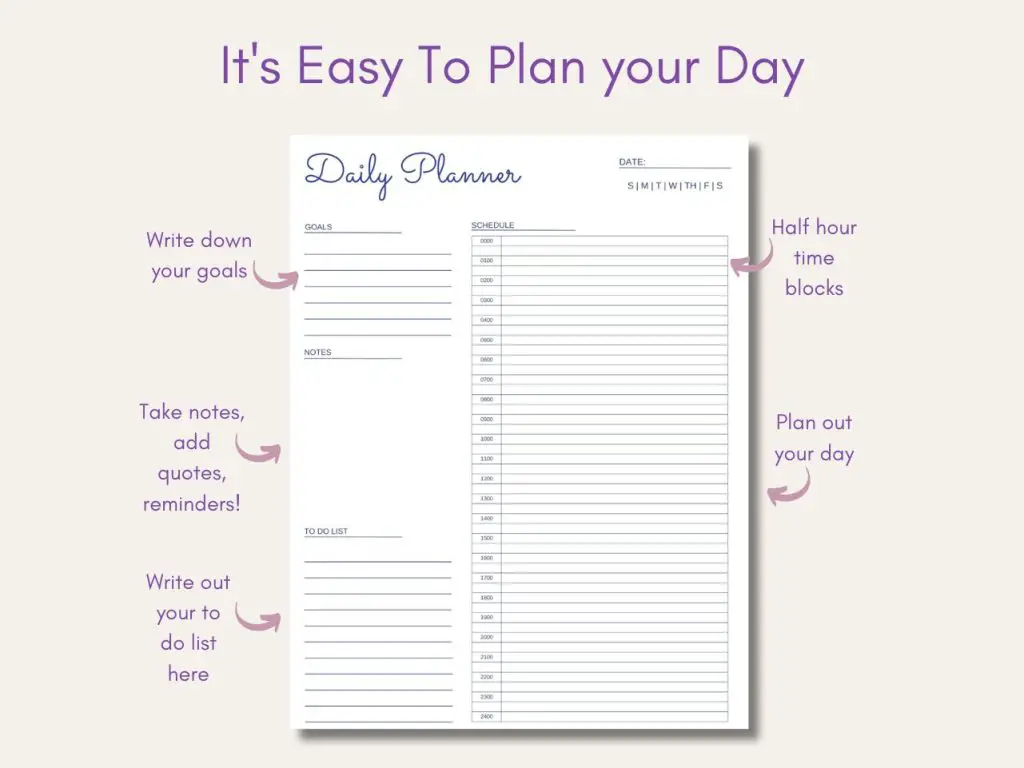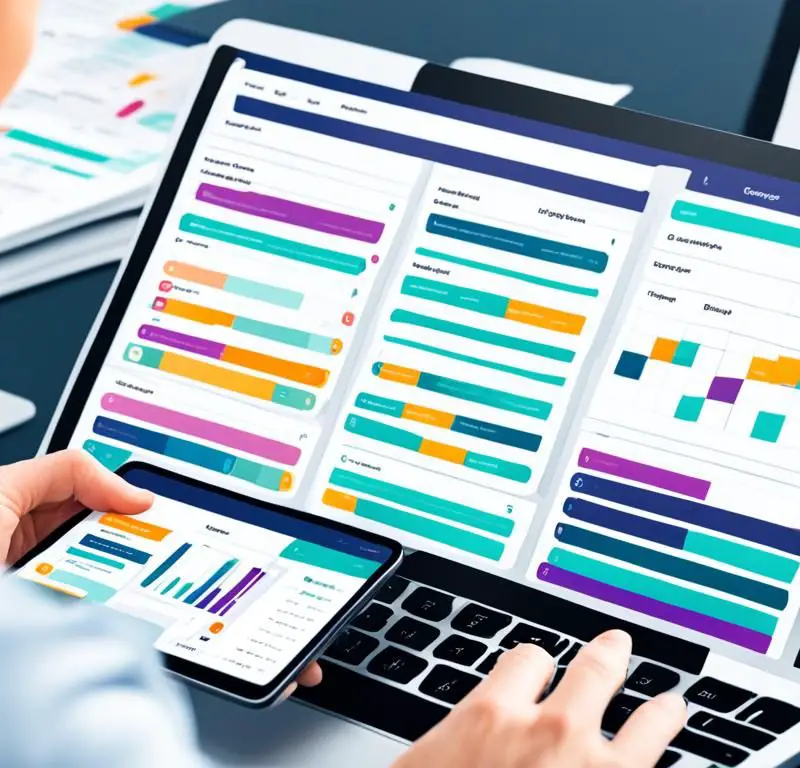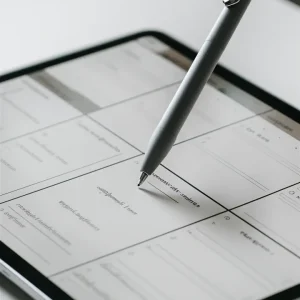Disorganization can be a significant roadblock to achieving productivity and profitability, both in personal life and in business.
For parents, who often juggle multiple responsibilities, understanding the habits that lead to disorganization and learning strategies to combat them is crucial.
This blog post will delve into the ways disorganization affects productivity and profit, identify bad habits that lead to business disorganization, and offer practical tips for positive change.
This post may contain affiliate links, please read our disclosure policy to learn more.

How Disorganization Affects Productivity and Profit
Disorganization in any setting can have severe consequences:
- Decreased Efficiency: Time is wasted searching for misplaced items or information, leading to missed deadlines and lost opportunities.
- Lower Quality of Work: Haphazard efforts often result in subpar outcomes, impacting overall business reputation and profitability.
- Stress and Burnout: Constant chaos can lead to increased stress levels, affecting both mental health and job satisfaction.
Bad Habits That Lead to Business Disorganization
Several habits contribute to business disorganization:
- Avoiding Planning: Neglecting to plan is a major issue. The impact of avoiding planning on productivity is evident when tasks are forgotten or completed last minute.
- Multitasking: Attempting to handle multiple tasks simultaneously can decrease overall work quality. Problems with multitasking in the workplace include frequent errors and lower productivity.
- Allowing Distractions: Distractions are detrimental to maintaining focus. Overcoming distractions in the workplace is essential for maintaining a productive environment.
- Neglecting Email Management: A crowded email inbox can quickly become overwhelming. Managing a crowded email inbox is crucial for staying on top of communications.
Positive Changes for Disorganized People
Implementing positive changes can significantly improve productivity:
- Daily Planning Strategies for Better Organization: Start each day with a clear plan. Outline your tasks and set achievable goals to maintain focus.
- Setting Boundaries to Reduce Distractions: Establish clear work and personal time boundaries to minimize interruptions and enhance productivity.
- Time Management Tips: Prioritize tasks and allocate specific time slots for each activity to stay organized and productive.
Planning Tips for Disorganized Individuals
Adopting effective planning tips can transform disorganized habits:
- Importance of Writing Things Down: Keeping track of tasks and appointments by writing things down ensures nothing is overlooked.
- Keeping an Active Calendar: An active calendar helps you visualize your schedule and manage your time effectively.
- Prioritizing Tasks: Learn how to rank tasks by priority to stay organized and ensure high-priority tasks are completed first.
- Mise en Place for Better Organization and Productivity: Organize tools and materials efficiently before starting tasks to save time and effort.

Daily Planning Strategies for Better Organization
Developing a daily planning routine can help disorganized individuals:
- Morning Routine: Start each morning with a planning session. List your tasks, prioritize them, and allocate time slots for each.
- Review and Adjust: At the end of the day, review your accomplishments and adjust your plan for the next day as needed.
Overcoming Distractions in the Workplace
To improve focus and productivity, it is vital to reduce workplace distractions:
- Create a Distraction-Free Environment: Set up a workspace that minimizes interruptions. Use noise-canceling headphones if necessary.
- Schedule Breaks: Plan regular breaks to avoid burnout and maintain high productivity levels.
Setting Boundaries to Reduce Distractions
Establishing boundaries is crucial for maintaining focus:
- Communicate with Family: Let your family know your work hours and the importance of minimizing interruptions during those times.
- Use Technology Wisely: Set boundaries on technology use to prevent it from becoming a distraction.
Problems with Multitasking in the Workplace
Multitasking can significantly reduce work quality and efficiency:
- Focus on One Task: Concentrate on one task at a time to improve accuracy and output.
- Time Blocking: Allocate specific time blocks for different tasks to avoid the pitfalls of multitasking.
Improving Work Quality by Avoiding Multitasking
Single-tasking leads to better work quality:
- Deep Work: Engage in deep work sessions where you focus solely on one task without any distractions.
- Task Completion: Finish one task before moving on to the next to maintain high standards and efficiency.
Time Management Tips for Disorganized People
Effective time management can transform productivity:
- Prioritize: Focus on tasks that have the highest impact on your goals.
- Set Deadlines: Assign deadlines to tasks to create a sense of urgency and keep you on track.
Managing a Crowded Email Inbox
An organized email inbox boosts productivity:
- Email Management Strategies: Use folders, labels, and filters to sort emails and keep your inbox manageable.
- Regular Review: Set aside specific times to check and respond to emails to avoid constant distractions.
Email Management Strategies for Productivity
Implementing email management strategies can help you stay organized:
- Unsubscribe from Unnecessary Emails: Reduce clutter by unsubscribing from emails you no longer need.
- Use Templates: Create templates for common responses to save time.
Importance of Writing Things Down to Stay Organized
Writing things down is a simple yet effective organizational tool:
- To-Do Lists: Keep a running list of tasks to ensure nothing is forgotten.
- Notes and Reminders: Use notes and reminders to keep track of important deadlines and appointments.
Keeping an Active Calendar for Better Organization
An active calendar is essential for time management:
- Schedule Everything: Record all appointments, deadlines, and tasks in your calendar.
- Regular Updates: Regularly update your calendar to reflect changes and ensure it remains a reliable tool.
Mise en Place for Better Organization and Productivity
Adopting the concept of mise en place can streamline your workflow:
- Preparation: Prepare all necessary materials and tools before starting a task.
- Organization: Keep your workspace organized to reduce time spent searching for items.
Organizing Tools and Materials Efficiently
Efficient organization of tools and materials is crucial:
- Designated Spaces: Assign specific places for all your tools and materials.
- Regular Maintenance: Regularly check and maintain your organizational system to ensure it remains effective.
Prioritising Tasks for Improved Productivity
Prioritizing tasks is key to staying organized:
- Urgent vs. Important: Learn to distinguish between urgent and important tasks to focus on what truly matters.
- Task Ranking: Rank tasks by priority to ensure critical tasks are completed first.
By understanding and addressing the habits of disorganized people, parents can create more productive and profitable environments both at work and at home. Implementing these strategies can lead to significant improvements in efficiency, work quality, and overall satisfaction.




